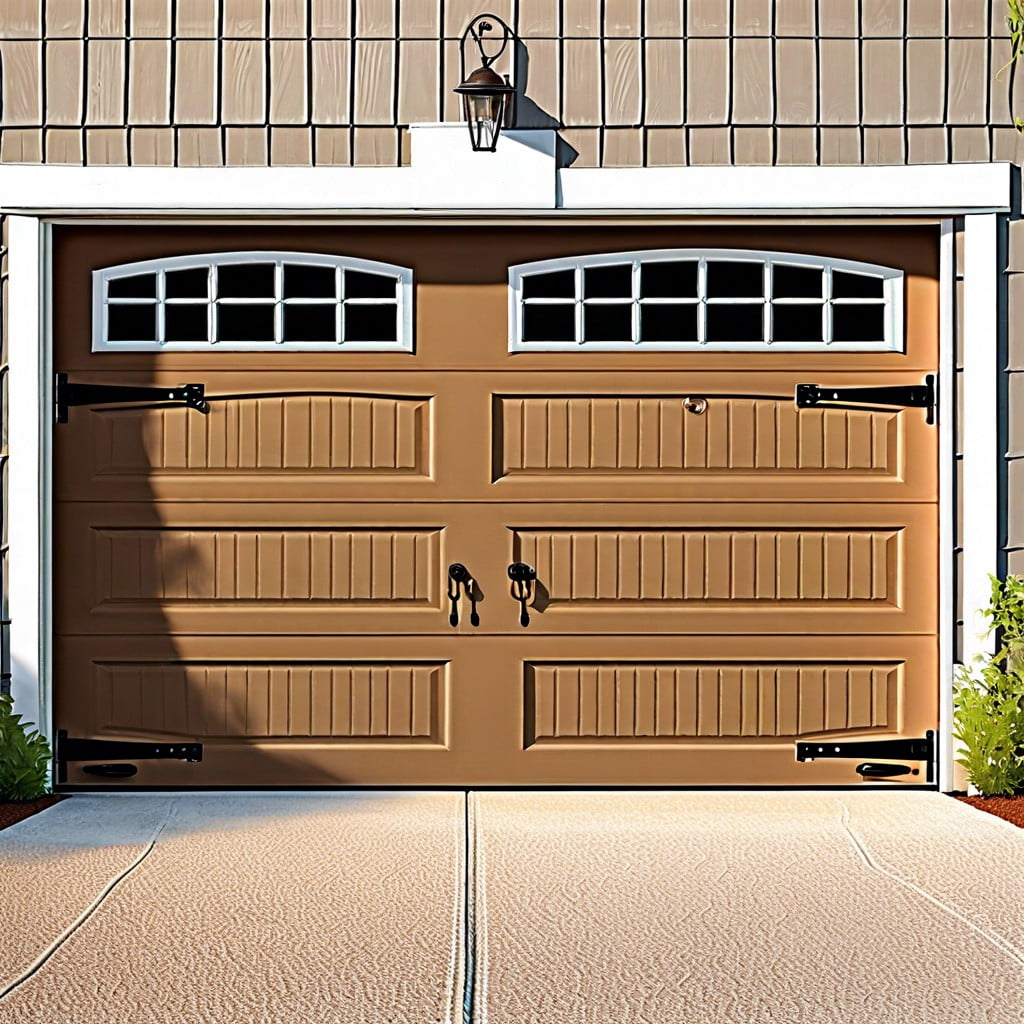Learn how to quiet a noise-making garage door with practical, step-by-step solutions.
Key takeaways:
- Common causes: wear and tear, loose bolts/screws, lack of lubrication, worn rollers
- Solutions: tighten loose hardware, lubricate moving parts, replace worn rollers
- Tightening bolts/screws reduces clamor significantly
- Lubricating rollers/hinges/tracks with silicone-based grease quiets door
- Swap worn steel rollers for nylon ones to reduce noise
Common Causes of Noisy Garage Doors

A garage door’s symphony of rattles, squeaks, and groans often boils down to routine wear and tear. Hinges gradually age and metal tracks may bend or warp over time, creating a less-than-harmonious operation. Loose bolts and screws contribute their fair share to the racket as they provide less stability, causing components to knock against each other with every use. A lack of proper lubrication can also sing a tune of grinding and screeching, signaling metal parts rubbing together without sufficient slip. Lastly, worn rollers, perhaps the most common culprits, can sound like a train chugging along the tracks, especially if they’re steel and not nylon with sealed bearings. Identifying the exact source might feel like a game of detective, but once pinpointed, the path to silence becomes much clearer.
Solutions for Noisy Garage Doors
Having pinpointed what’s got your garage door sounding like a poorly rehearsed orchestra, let’s dive into the fix-it tactics. Grab your toolbox, because it’s time to bring back the sweet sound of silence.
First, zero in on any bolts and nuts that have decided to dance loose over time. A ratchet or a wrench will be your best pals here. Tightening these jiggly bits can make a world of difference, nipping that clamor in the bud.
Next on the agenda: a spot of lubrication. Think of it as a spa treatment for your door’s moving parts. A squirt of silicone-based lubricant or garage door spray on the rollers and hinges can work wonders, transforming screeches into whispers.
Don’t turn a blind eye to your door’s rollers; worn-out ones are notorious gossips that love to chatter. Swapping them out for nylon rollers can shush them up good, and your door will glide smoother than a hot knife through butter.
And remember, before playing doctor with your door, treat safety as your plus-one. If springs or cables are involved, they’re not the kind to tango with; that’s your cue to tag in the pros.
Tighten Loose Hardware
Rattling and rumbling often come from bolts and screws that have loosened over time due to the door’s vibrations. Check hinges, tracks, and the brackets that hold the garage door to the wall and ceiling. A simple twist of the wrench can tighten them and may reduce the clamor significantly.
Bear in mind, the garage door’s hardware is akin to a symphony. Each bolt and bracket plays its part in a harmonious operation. Securing them is like tuning an instrument—vital for a smooth performance.
However, exercise a bit of caution with the door’s spring system; these components are under high tension and can turn a DIY fix into a trip to the emergency room if handled improperly.
Lubricate Moving Parts
A good old-fashioned lubrication spree often quiets a garage door’s wails and squeaks. Here’s a straightforward game plan for getting those moving parts whisper-quiet:
- Choose your lubricant wisely. Silicone or lithium-based greases work wonders without attracting grime like oil-based lubricants.
- Focus on rollers, hinges, and tracks. These are the trio that head the garage door’s touring band – keep them in tune and the performance is smooth.
- Don’t douse; a light spray will do. More isn’t always merrier – too much grease can gum up the works and attract dust like bees to honey.
- Hit the springs. They’re the unsung heroes, but even heroes need a bit of TLC. A spritz helps them flex with grace.
Just remember to steer clear of the nylon parts if your door has them. They prefer to run ‘au naturel’. Keep a rag handy for drips; your garage floor will thank you. Keep things moving smoothly and silently, like ninjas conducting a stealth operation.
Replace Worn Rollers
Rollers are the wheels that guide your garage door along its tracks. Over time, these wheels can wear down or develop flat spots, leading to a cacophony every time you open or close the door. Nylon rollers tend to operate more quietly than their steel counterparts, and they don’t require lubrication, which further reduces maintenance needs and noise. However, they may not be as durable, so consider the trade-off.
If you’ve got a roller rave happening in your garage, it might be time to swap out the old set. Choose rollers with sealed bearings to prevent dust and grime build-up, which can contribute to noise. A pro tip: check the manufacturer’s recommendations for your door type; not all rollers are universal fits.
Changing the rollers isn’t rocket science, but it does take a steady hand and an understanding of the door’s operation. You should replace rollers one at a time to avoid unleashing the whole door from its tracks. Remember, a misaligned door can turn your quiet evening into a noisy nightmare.
Keep in mind that the bottom roller brackets are under great tension and can be hazardous. If you’re not up for a mini-adventure or handy with tools, consider flagging down a professional. Safety always trumps the satisfaction of a DIY job well done.